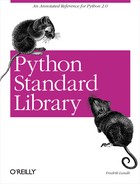(Optional) The zlib module provides support for “zlib”
compression. (This compression method is also known as
“deflate.”)
Example 2-43 shows how the compress and decompress
functions take string arguments.
Example 2-43. Using the zlib Module to Compress a String
File: zlib-example-1.py import zlib MESSAGE = "life of brian" compressed_message = zlib.compress(MESSAGE) decompressed_message = zlib.decompress(compressed_message) print "original:", repr(MESSAGE) print "compressed message:", repr(compressed_message) print "decompressed message:", repr(decompressed_message)original: 'life of brian'compressed message: 'x234313311LKU310OSH*312L314�03�00!�10�04302'decompressed message: 'life of brian'
The compression rate varies a lot, depending on the contents of the file, as you can see in Example 2-44.
Example 2-44. Using the zlib Module to Compress a Group of Files
File: zlib-example-2.py
import zlib
import glob
for file in glob.glob("samples/*"):
indata = open(file, "rb").read()
outdata = zlib.compress(indata, zlib.Z_BEST_COMPRESSION)
print file, len(indata), "=>", len(outdata),
print "%d%%" % (len(outdata) * 100 / len(indata))
samplessample.au 1676 => 1109 66%
samplessample.gz 42 => 51 121%
samplessample.htm 186 => 135 72%
samplessample.ini 246 => 190 77%
samplessample.jpg 4762 => 4632 97%
samplessample.msg 450 => 275 61%
samplessample.sgm 430 => 321 74%
samplessample.tar 10240 => 125 1%
samplessample.tgz 155 => 159 102%
samplessample.txt 302 => 220 72%
samplessample.wav 13260 => 10992 82%You can also compress or decompress data on the fly, which Example 2-45 demonstrates.
Example 2-45. Using the zlib Module to Decompress Streams
File: zlib-example-3.py
import zlib
encoder = zlib.compressobj()
data = encoder.compress("life")
data = data + encoder.compress(" of ")
data = data + encoder.compress("brian")
data = data + encoder.flush()
print repr(data)
print repr(zlib.decompress(data))
'x234313311LKU310OSH*312L314�03�00!�10�04302'
'life of brian'Example 2-46 shows how to make it a bit more convenient to read a compressed file, by wrapping a decoder object in a file-like wrapper.
Example 2-46. Emulating a File Object for Compressed Streams
File: zlib-example-4.py
import zlib
import string, StringIO
class ZipInputStream:
def _ _init_ _(self, file):
self.file = file
self._ _rewind()
def _ _rewind(self):
self.zip = zlib.decompressobj()
self.pos = 0 # position in zipped stream
self.offset = 0 # position in unzipped stream
self.data = ""
def _ _fill(self, bytes):
if self.zip:
# read until we have enough bytes in the buffer
while not bytes or len(self.data) < bytes:
self.file.seek(self.pos)
data = self.file.read(16384)
if not data:
self.data = self.data + self.zip.flush()
self.zip = None # no more data
break
self.pos = self.pos + len(data)
self.data = self.data + self.zip.decompress(data)
def seek(self, offset, whence=0):
if whence == 0:
position = offset
elif whence == 1:
position = self.offset + offset
else:
raise IOError, "Illegal argument"
if position < self.offset:
raise IOError, "Cannot seek backwards"
# skip forward, in 16k blocks
while position > self.offset:
if not self.read(min(position - self.offset, 16384)):
break
def tell(self):
return self.offset
def read(self, bytes = 0):
self._ _fill(bytes)
if bytes:
data = self.data[:bytes]
self.data = self.data[bytes:]
else:
data = self.data
self.data = ""
self.offset = self.offset + len(data)
return data
def readline(self):
# make sure we have an entire line
while self.zip and "
" not in self.data:
self._ _fill(len(self.data) + 512)
i = string.find(self.data, "
") + 1
if i <= 0:
return self.read()
return self.read(i)
def readlines(self):
lines = []
while 1:
s = self.readline()
if not s:
break
lines.append(s)
return lines
#
# try it out
data = open("samples/sample.txt").read()
data = zlib.compress(data)
file = ZipInputStream(StringIO.StringIO(data))
for line in file.readlines():
print line[:-1]
We will perhaps eventually be writing only small
modules which are identified by name as they are
used to build larger ones, so that devices like
indentation, rather than delimiters, might become
feasible for expressing local structure in the
source language.
-- Donald E. Knuth, December 1974